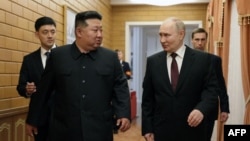Russian President Vladimir Putin arrived early Wednesday in North Korea, where he is expected to sign a treaty outlining Moscow’s expanded cooperation with Pyongyang.
The Russian president, who is making his first visit to Pyongyang in 24 years, landed in Pyongyang, where at least several main streets were lined with portraits of Putin and the Russian flag, according to Russian media.
Putin has decided to sign a comprehensive strategic partnership agreement with North Korean leader Kim Jong Un during his two-day visit, Russian news agency TASS reported.
The report provided no details of the document, although earlier the agency quoted a Putin foreign policy aide as saying it would likely cover defense matters.
Earlier Tuesday, Putin vowed to work with North Korea to counter sanctions as both countries expand their “many-sided partnership,” according to a letter published in North Korean state media.
In the letter, Putin said the two countries would develop trade mechanisms “not controlled by the West” and would “jointly oppose illegitimate unilateral restrictions” — a likely reference to the many individual sanctions that countries have enacted against Pyongyang and Moscow.
Russia is a longtime supporter of North Korea. Although ties have sometimes been rocky, both countries recently found more reasons to work together, especially following Russia’s 2022 invasion of Ukraine.
U.S. officials say North Korea has provided Russia with 11,000 containers of munitions, as well as ballistic missiles, for use in the Ukraine battlefield. North Korea and Russia deny such weapons deals, even though a growing number of independent observers have documented North Korean weapons being used against Ukrainian forces.
“Moscow and Pyongyang will likely continue to deny violations of international law but have notably shifted from hiding their illicit activities to flaunting their cooperation,” said Leif-Eric Easley, a professor at Ewha University in Seoul.
Defense ties
U.S. officials have expressed concerns that Russia may provide advanced weapons or other help related to North Korea’s nuclear program.
Such worries intensified last September when Kim inspected numerous advanced Russian weapons while touring several military sites in eastern Russia, including a modern space launch facility.
Although North Korea’s latest satellite launches showed signs of Russian assistance, analysts debate how far defense cooperation would go, noting that Russia does not often share its most advanced military technology.
“These states do not share durable alliance institutions and values; they are only weakly bound together by resistance to the enforcement of international laws and norms,” said Easley.
Speaking in Washington on Tuesday, NATO Secretary-General Jens Stoltenberg said the alliance is concerned about Russia's "potential support" for North Korea's "missile and nuclear programs."
"Putin's visits to North Korea demonstrate and confirm the very close alignment between Russia and authoritarian states like North Korea, but also China and Iran," Stoltenberg said after meeting with Secretary of State Antony Blinken.
"Our security is not regional. It's global. What happens in Europe matters for Asia. What happens in Asia matters for us," Stoltenberg said.
Treaty history
Analysts will closely parse the language of any new treaty signed by Putin and Kim.
Russia currently has comprehensive strategic partnerships with countries that include Vietnam, Mongolia and some Central Asian nations.
While such documents form the basis for Russia’s “highest type of interstate relations,” they do not amount to alliance treaties, observed former Russian diplomat Georgy Toloraya.
“I don’t think that this treaty would include a clause which directly calls for military assistance, but it will certainly give room to imagine a situation where this could be provided,” he said in an interview with VOA.
In 1961, North Korea and the Soviet Union signed a friendship and mutual assistance treaty that included a provision for automatic military intervention in emergencies.
That deal was abolished after the Soviet Union's collapse. The two countries signed a new treaty in 2000, but it focused on economic rather than military matters.
According to Putin aide Yuri Ushakov, the treaty being negotiated by Kim and Putin would replace all other bilateral treaties.
Obstacles
If Putin’s letter is any indication, his visit will also likely focus on expanding economic ties, including by ramping up exchanges related to education, culture and tourism.
However, this plan faces obstacles due to United Nations Security Council resolutions that prohibit a wide range of economic engagement with North Korea.
While Russia says it no longer supports U.N. sanctions on North Korea, it has not formally announced that it will stop observing them.
Instead, Russia may search for what it sees as loopholes that facilitate cooperation even in areas that are subject to U.N. sanctions, such as North Korean laborers earning income abroad.
For instance, North Korean IT specialists could work remotely from their home country without technically receiving income abroad, said Toloraya, a former member of the U.N. Panel of Experts, which was meant to monitor enforcement of the North Korea sanctions.
Russia earlier this year effectively abolished the U.N. panel — one of its boldest steps to unilaterally degrade the U.N. sanctions regime it once supported.
What North Korea wants
For Kim, Putin’s visit is meant to provide a boost in domestic legitimacy, especially amid North Korea’s increasingly public frictions with its main economic backer, China, said Kim Gunn, who earlier this year stepped down as South Korea’s top nuclear envoy.
“North Koreans feel nervous about that, because their economy is 99% dependent on China,” said Kim, who is now a member of South Korea’s National Assembly. “Kim Jong Un’s answer is to say, ‘Don’t worry, we still have Russia.’”
VOA State Department bureau chief Nike Ching in Washington contributed to this report.







